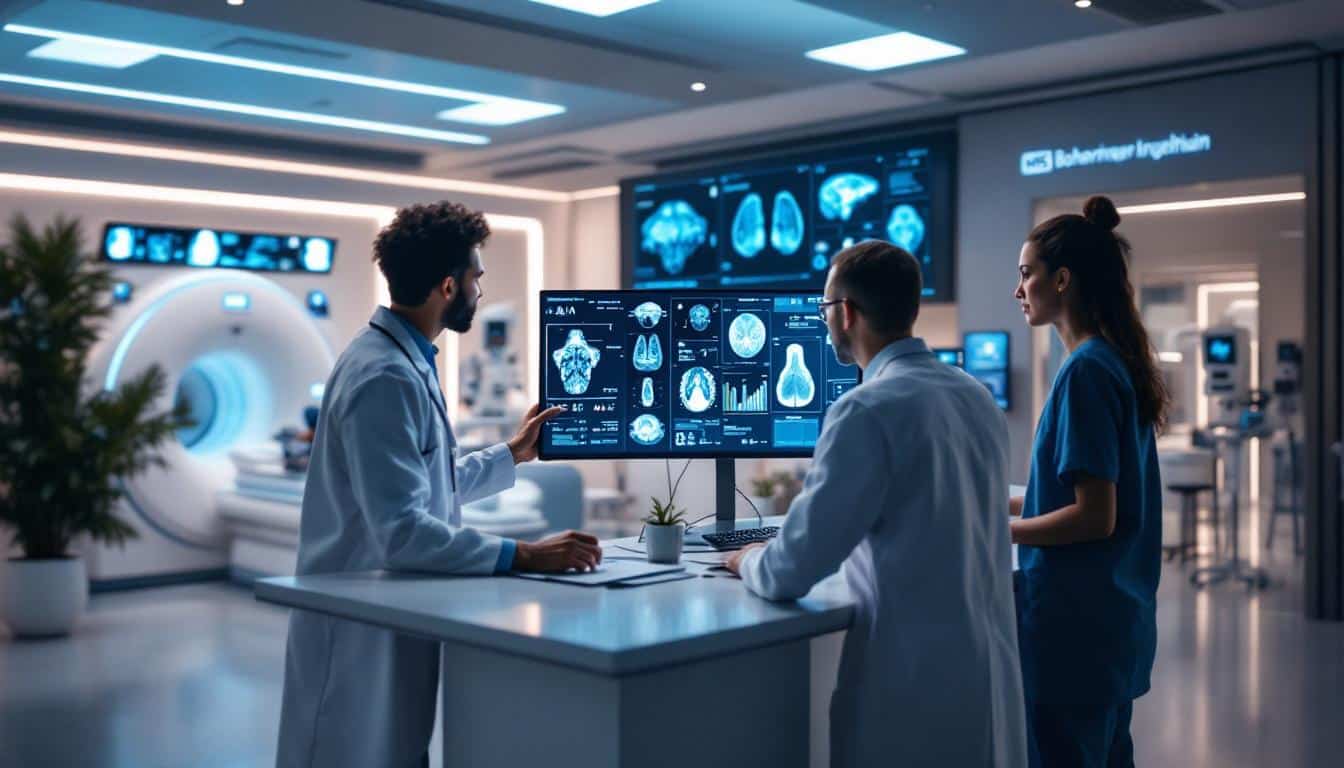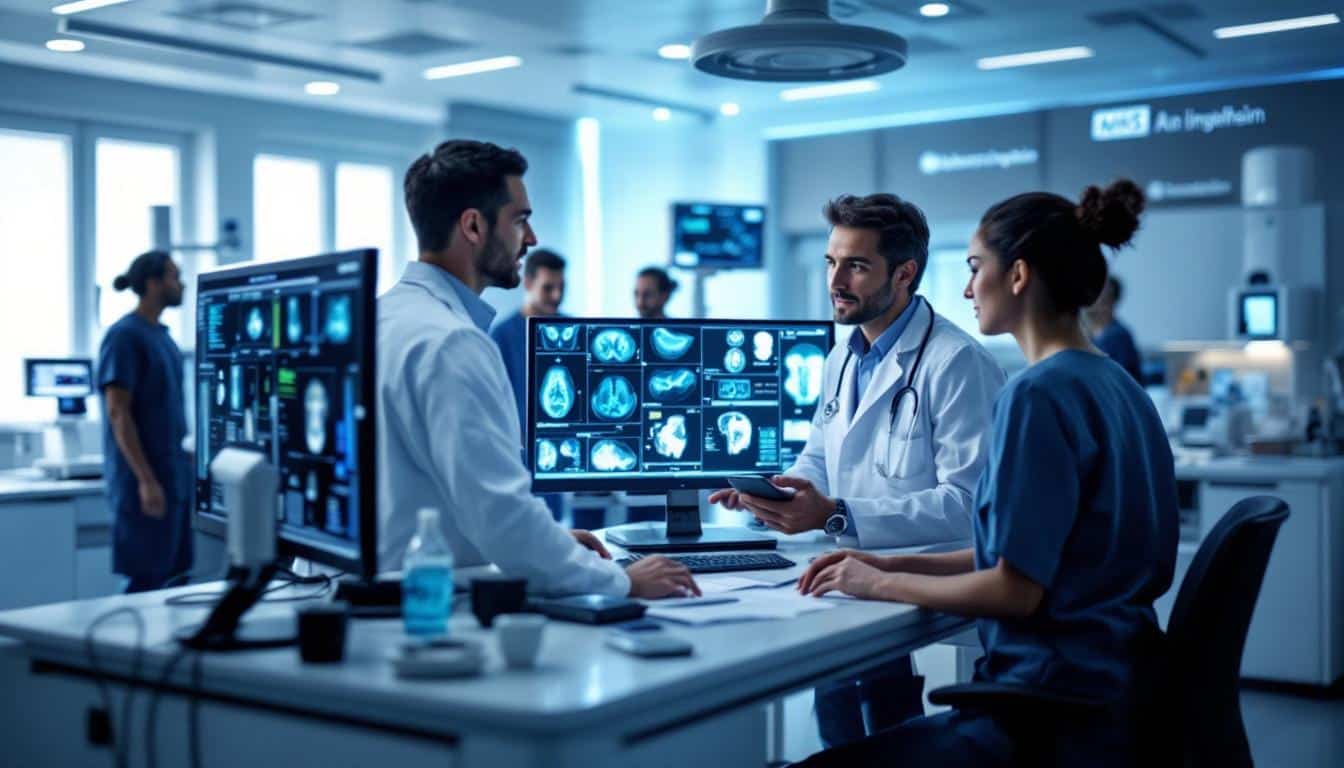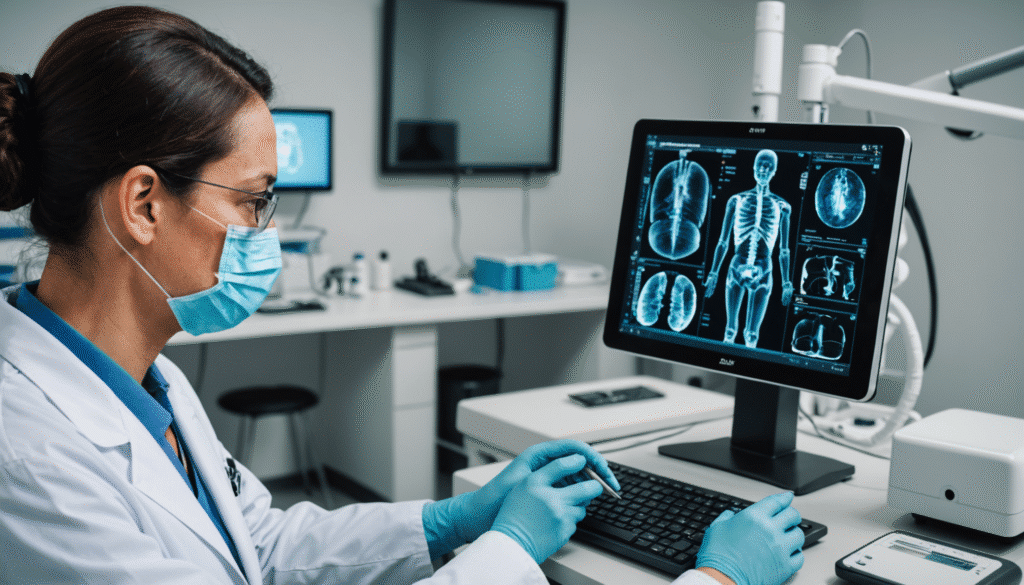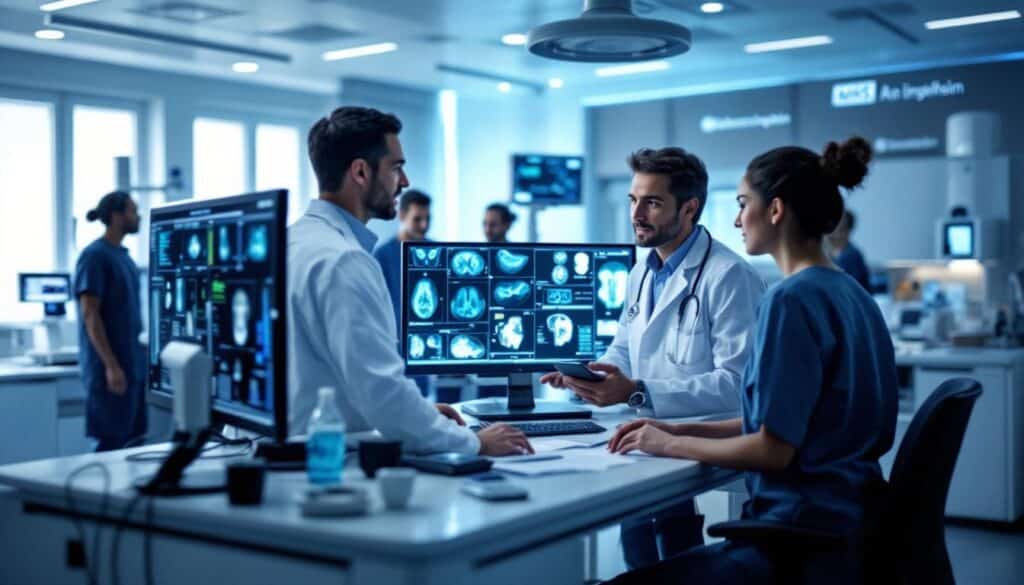Technological advances in the medical field continue to push the boundaries of innovation.Artificial intelligences dedicated to medical imaging play a central role in this transformation.Companies like Coreline Soft and VUNO are leading the charge by securing major contracts and international certifications.
Coreline Soft recently signed several supply contracts in the United Kingdom, Europe, and Taiwan, thereby demonstrating medical institutions’ trust in its innovative solutions. The NHS of the United Kingdom has adopted the medical image analysis software AVIEW for the Eastern Diagnostic Imaging Network project, which will be deployed in twelve hospitals, including Cambridge University Hospital. Furthermore, the French National Cancer Institute has selected Coreline Soft as the exclusive supplier for its lung cancer screening project, using a solution capable of detecting various pulmonary disorders from a single chest scan. For its part, VUNO has obtained EU MD and UKCA certifications for its cardiac arrest risk assessment tool, paving the way for expansion in the Middle East. Finally, AITRICS received approval from Hong Kong for its predictive software for patient deterioration, further strengthening its global presence in the medical AI sector.

In the constantly evolving landscape of medical imaging, artificial intelligence (AI) plays a crucial role in improving diagnostic accuracy and optimizing clinical processes. Coreline Soft, a South Korean developer specializing in AI for imaging, has recently signed several significant contracts with international partners such as the British NHS, Boehringer Ingelheim Taiwan, and other prestigious institutions. These collaborations mark an important step in the adoption of advanced AI solutions within global health systems.
What are the details of Coreline Soft’s new contracts with the British NHS?
The British NHS awarded Coreline Soft its first contract to provide the AI-equipped medical image analysis software AVIEW for the Eastern Diagnostic Imaging Network project. This project aims to modernize diagnostic capabilities in 12 hospitals in eastern England, including the prestigious Cambridge University Hospital.
The implementation of AVIEW will improve the accuracy of health screenings and general CT exams, thereby reducing human errors and accelerating the diagnostic process. This initiative is part of a broader NHS strategy to integrate innovative technologies to meet the growing demand for efficient and reliable healthcare services.
To learn more about the impact of AI on diagnostic accuracy, see this article.
How does Coreline Soft collaborate with Boehringer Ingelheim Taiwan?
In partnership with Boehringer Ingelheim Taiwan, Coreline Soft will deploy its AI software module to identify patterns of pulmonary deformation in partner hospitals. This software plays a crucial role in the testing and verification program for anti-fibrotic drugs, including Ofev (nintedanib) and the experimental drug nerandomilast.
With this technology, doctors can quickly identify eligible patients suffering from interstitial lung diseases and abnormalities, thus facilitating the selection of participants for clinical trials. The module automatically analyzes thoracic CT reports and integrates them in near-real time into PACS and RIS systems, significantly improving the efficiency of the clinical research process.
For an assessment of new medical imaging technologies in pediatrics, see this link.
What are Coreline Soft’s other important partnerships?
In addition to contracts with the NHS and Boehringer Ingelheim, Coreline Soft has also been designated as the exclusive provider of its AI image analysis software for the national lung cancer screening project of the National Cancer Institute in France. Host hospitals, such as Assistance Publique – Hôpitaux de Paris and Lyon City Hospital, have chosen Coreline Soft’s AI solution capable of detecting pulmonary nodules, emphysema, and coronary artery calcification in a single thoracic CT analysis.
This solution contributes to earlier and more accurate lung cancer screening, which is essential for improving survival rates and optimizing treatments. The adoption of these technologies by key institutions highlights the growing trust in AI solutions to transform traditional medical practices.
What are VUNO’s recent developments in the field of medical AI?
Among the other major players in medical AI, VUNO has recently obtained EU MD and UKCA certifications for its flagship cardiac arrest risk assessment tool. These certifications allow VUNO to prepare for similar efforts in the Middle East, with the aim of finalizing registration this year and starting to provide its software in hospitals in the region next year.
VUNO’s cardiac arrest risk assessment software, already used in over 130 hospitals in South Korea, received the revolutionary device designation from the U.S. Food and Drug Administration (FDA) in 2023. This recognition enhances VUNO’s credibility and paves the way for broader adoption of its innovative solutions.
To learn more about the developments in medical technologies in response to tariff upheavals, visit this article.
What are AITRICS’s innovations in predicting patient deterioration?
AITRICS, another South Korean company in the medical AI sector, has announced the approval of its AI software for predicting patient deterioration by the Hong Kong government. This software analyzes data from electronic medical records (EMR) to predict the risk of major adverse events such as sepsis, cardiac arrest, transfer to intensive care, and death over a four to six hour period.
This is the fourth regulatory approval obtained by AITRICS, following approvals in South Korea, the United States, and Vietnam. This international expansion highlights AITRICS’s capacity to meet the diverse needs of global health systems in proactive patient care management.
What are the recent developments of Aevice Health in connected medical devices?
Meanwhile, the Singaporean company Aevice Health has obtained 510(k) clearance from the U.S. FDA for the pediatric use of its portable smart stethoscope designed for remote respiratory monitoring in children aged three and older. This device, which uses AI to analyze heart and breath sounds, represents a significant advancement in pediatric care by allowing accurate and continuous real-time monitoring.
The development of this connected stethoscope is part of a growing trend of integrating wearable technologies into health monitoring, thus offering more accessible and efficient solutions for patients and healthcare professionals. For more information on fundraising and early cancer detection technology developments, see this page.
What are the tariff impacts on medical technology companies like GE Healthcare?
Medical technology companies are not immune to economic challenges, as illustrated by the recent forecasts from GE Healthcare, which has lowered its profit estimates for 2025 due to the impact of tariffs. These tariff changes have a disproportionate effect on certain stocks in the field, making cost management and operational optimization essential to maintain competitiveness.
Fluctuations in tariffs can affect profit margins and slow down innovation by imposing additional costs on companies. It is therefore crucial for industry players to adapt quickly and find effective strategies to minimize economic impact while continuing to invest in research and development of new technologies.
For an in-depth analysis of the tariff impacts on medical technologies, see this article.
How do investments support innovation in medical AI?
Investments play a decisive role in the development and adoption of medical AI technologies. For example, Aevice Health raised significant funds earlier this year through investments from Denka via Pegasus Tech Ventures and from the venture capital firm Elev8, totaling $9.1 million since 2021. These funds enable companies to continue their research, enhance their products, and expand their presence in new markets.
Financial support is crucial for startups and growth companies in the medical AI sector, allowing them to overcome technological and regulatory challenges while accelerating the deployment of innovative solutions. Investments also promote collaboration between different stakeholders in the sector, thereby stimulating innovation and the continuous improvement of health technologies.
To learn more about the latest fundraising and innovation initiatives, visit this link.
What are the advantages of integrating AI into healthcare systems?
The integration of AI into healthcare systems offers numerous advantages, including a significant improvement in diagnostic accuracy, a reduction in medical errors, and an optimization of clinical workflows. AI solutions like those developed by Coreline Soft allow for the rapid analysis of large amounts of medical imaging data with increased precision, thereby facilitating informed clinical decisions.
Moreover, AI contributes to better management of hospital resources by automating repetitive tasks and allowing healthcare professionals to focus on more critical aspects of patient care. The use of AI in monitoring and predicting medical conditions also allows for earlier interventions, thus improving patient outcomes and reducing costs associated with late treatments.
To explore the impact of AI on diagnostic accuracy in imaging, see this article.
What challenges do medical technology companies face?
Despite the many advantages, medical technology companies utilizing AI must overcome several challenges. Among these, regulatory compliance is paramount, as evidenced by the efforts made by VUNO and AITRICS to obtain international certifications. Navigating the various regulatory requirements of global markets requires considerable resources and specialized expertise.
Additionally, integrating AI solutions into existing health systems can encounter technical and organizational obstacles. It is essential to ensure interoperability with current systems and to train medical staff in the effective use of these new technologies. Protecting patient data and ensuring confidentiality are also major concerns that must be addressed to build trust in the use of AI.
For an assessment of new technologies and their challenges in pediatric medical imaging, see this link.
What are the expected future developments in medical imaging AI?
The future of AI in medical imaging looks promising, with continuous advancements in accuracy, speed, and efficiency. Companies like Coreline Soft, VUNO, and AITRICS continue to develop innovative solutions that push the boundaries of what AI can achieve in healthcare. The integration of technologies like deep learning and predictive analytics opens new opportunities for even earlier and more accurate diagnostics.
Furthermore, the international expansion of AI solutions allows for wider adoption and standardization of diagnostic practices, which could reduce disparities in healthcare across the globe. Strategic collaborations between technology companies and health institutions are essential to catalyze these advances and ensure that AI innovations benefit the widest audience.
To keep up with recent developments and future initiatives in medical AI, visit this link.
#>
The recent victories of Coreline Soft in the field of AI-assisted medical imaging mark a significant milestone in technological innovation in the service of health. By winning major contracts with the British NHS and Boehringer Ingelheim, the South Korean company demonstrates its ability to meet the complex needs of international health systems.
With the NHS, Coreline Soft is deploying its intelligent AVIEW software in 12 hospitals, including the prestigious Cambridge University Hospital. This initiative aims to improve health screening processes and general CT exams, thus offering a faster and more accurate analysis of medical images. This collaboration highlights the growing importance of artificial intelligence in transforming medical practices, enabling healthcare professionals to make more informed decisions and better serve patients.
Additionally, the partnership with Boehringer Ingelheim Taiwan for the lung cancer screening project illustrates the versatility of Coreline Soft’s solutions. By providing a pulmonary deformation pattern analysis module, the company facilitates the rapid identification of patients eligible for clinical trials, thereby accelerating the development of innovative treatments for lung diseases. This initiative demonstrates Coreline Soft’s commitment to actively contributing to medical research and improving available treatments.
These successes reinforce Coreline Soft’s position as a leader in the medical AI sector, opening the door to new opportunities in European and Asian markets. Recognition by renowned institutions, such as the National Cancer Institute in France, attests to the reliability and effectiveness of the solutions offered by the company.
In conclusion, Coreline Soft’s strategic partnerships with the NHS, Boehringer Ingelheim, and other key players demonstrate the profound impact of AI on the healthcare sector. By continually innovating and responding to contemporary medical challenges, Coreline Soft significantly contributes to improving the quality of care and the well-being of patients worldwide.














